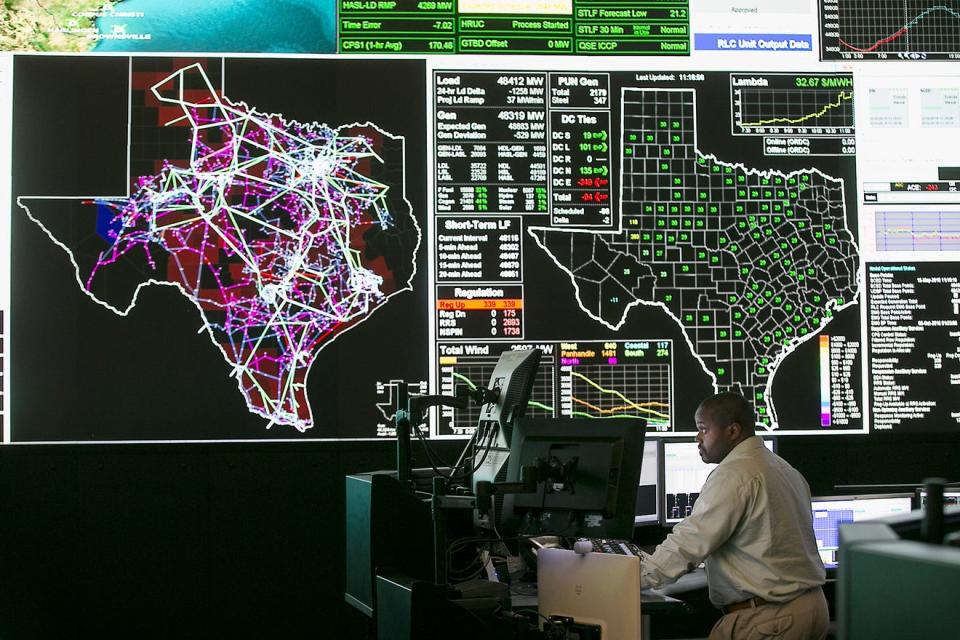'The lights will stay on,' top Texas utility regulator vows in wake of February blackouts

The state's top utility regulator vowed Wednesday that “the lights will stay on” this winter, lining up behind a guarantee issued by Gov. Greg Abbott about two weeks ago that there won’t be a repeat of February’s failure of the electricity grid.
Peter Lake, chairman of the Texas Public Utility Commission, said Texans can be confident that the grid is "stronger and more reliable than ever" because of what he called unprecedented regulatory and operational reforms made in the wake of the February calamity.
"When you look at all of that, when you look at the realities on the ground in front of us — yes, we can say the lights are going to stay on" this winter, he told reporters during a news conference.
Lake's comments echo Abbott's public guarantee, made during a TV interview, that there won't be a replay of the near collapse of the grid 10 months ago, which triggered extensive blackouts amid a severe winter freeze. The winter storms led to hundreds of deaths and billions of dollars in property damage.
More: 'A terrible loss': Austin saw days of deaths and cold in February outages during Texas freeze
More: Many power units that failed during Texas freeze also failed in 2011 storm
Some energy experts and representatives of public interest groups have called Abbott's guarantee ill-advised and potentially dangerous. They say it could prompt Texans to let their guard down and forgo contingency planning for possible power outages despite good reason to be wary.
If weather patterns in Texas are typical this winter, however, both Abbott and Lake appear to be on firm footing in issuing their assurances. That's because seasonal assessments of the state's grid indicate it will have ample reserves of generation capacity under normal conditions, just as such reports did heading into last winter.
But that's not the case if the weather takes an unusually bad turn, as it did in February. According to the assessments — including one by the operator of the state's power grid, the Electric Reliability of Council of Texas — certain extreme weather-related circumstances would cause generation capacity to fall far short of electricity demand again this winter, with significant power outages the likely outcome.
The report by the Electric Reliability Council, better known as ERCOT, described the extreme winter scenarios it evaluated — which include combinations of surging demand and large numbers of power plants forced offline for various reasons — as "low-probability" events. But the agency didn't take into account an extreme scenario on the scale of February's calamity, opting not to include it in the assessment because of the "exceptional impact" it had.
Still, Lake dismissed the ERCOT seasonal report as not particularly relevant to his assurance that "the lights will stay on" this winter. The PUC oversees ERCOT, and ERCOT interim CEO Brad Jones participated in Wednesday's news conference and didn't object to Lake's characterization.
More: In wake of power outages, Texas lowers price cap for electricity providers
More: Amid criticism, Texas regulators tighten winterization rules for natural gas sector
The assessment “is a scenario analysis that evaluates a wide range of possibilities," Lake said. "It's a scenario analysis — not a predictive tool — and it doesn't incorporate these extraordinary measures" that the state has taken to shore up the grid in the wake of the disaster.
Others have called the notion of such a blanket assurance unrealistic, particularly given the Texas grid's recent history.
“A guarantee is absurd and not helpful," said Doug Lewin, an Austin-based energy consultant, speaking specifically about Abbott's comments. "I think it's fair to say it's actually dangerous. There's no way anybody can make a guarantee about the power system in extreme weather — period."
The PUC and ERCOT — both of which have undergone leadership changes and overhauls in the wake of February's disaster — have taken steps aimed at bolstering the grid that have generally been viewed as positive. But the degree of the grid's increased reliability heading into this winter is a point of debate, with some observers calling the improvements only marginal.
Among the reforms, operators of power plants were required by Dec. 1 to use their "best efforts" to implement decade-old winterization recommendations that Texas regulators have previously ignored, and top executives of the companies also were required by then to file notarized attestations that they had done so.
Jones said Wednesday that ERCOT received 97% of the estimated 855 attestations it expected from generators by the deadline and has begun the process of inspecting some of the facilities. ERCOT has been discussing the remaining 3% with the utility commission, he said.
“Those who have not been proactive (in making winter preparations) will be penalized swiftly and heavily," Lake said during Wednesday's news conference, noting that the utility commission has the authority to issue fines of up to $1 million per day for each incident of noncompliance.
Later Wednesday, the PUC announced that it had filed violations against eight companies for failing to file their winter readiness reports by the deadline. It said they face a combined $7.5 million in administrative penalties.
Still, energy experts and public interest groups have pointed to a continued lack of winterization mandates for the natural gas sector as a weak link in the effort to make the grid more reliable. The natural gas sector — which is overseen by the Texas Railroad Commission, not the utility commission — plays a key role on the ERCOT grid because many generators are fueled by natural gas.
This article originally appeared on Austin American-Statesman: 'The lights will stay on,' top state regulator pledges amid grid fears
